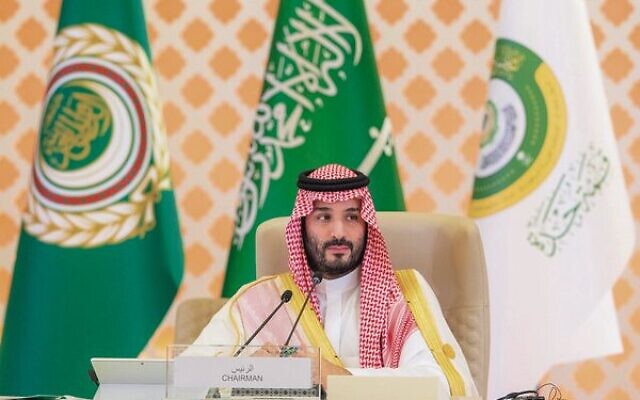Saudis said to be wary of full normalisation
Saudi Arabia is seeking a NATO-like mutual security treaty that would obligate the US to come to its defence if attacked, a civilian nuclear program monitored and backed by the US, and the ability to purchase more advanced weaponry from Washington.

(TIMES OF ISRAEL) – Saudi Crown Prince Mohammed bin Salman has reportedly told aides that he is not ready to fully normalise ties with Israel and is not eager to reach an agreement with the current hardline government led by Prime Minister Benjamin Netanyahu.
While US officials have stressed that their approach to an Israel-Saudi deal is not all or nothing and that they also back interim steps that bring the sides closer to full normalisation, the stance attributed to the crown prince in a Wall Street Journal report last week appeared to be the first time a Saudi official was suggesting that such intermediate moves might be as far as Riyadh is currently willing to go.
And while US officials have privately acknowledged that opponents of Palestinian sovereignty – who make up a clear majority in Netanyahu’s government – will complicate efforts to secure a normalisation deal, since it will require significant moves to revive the two-state solution, the report was also the first time discomfort with the idea of making any sort of deal with the current coalition was expressed by Riyadh as well.
At the same time, the Journal noted that bin Salman – known colloquially as MBS – has given conflicting messages to different audiences and that US officials still believe he is serious about trying to reach an agreement.
The report said that US and Saudi officials have agreed on broad terms for a potential Israel-Saudi deal, which would see the US make major security guarantees to Saudi Arabia, Riyadh take major steps to distance itself from China, and Israel take major steps towards creating an independent Palestinian state.
US officials told The Wall Street Journal that specific details would hopefully be hammered out in the next nine to 12 months, though they stopped short of suggesting that a deal would also be signed in that time period.
The White House flatly denied the report. Though National Security Council spokesperson John Kirby clarified that US President Joe Biden had indeed directed his top aides “to see what was in the realm of the possible when it comes to pursuing Israel-Saudi normalisation”, and that “there is a commitment by the administration to keep talking and to keep trying to move things forward”.
The broad terms presented by The Wall Street Journal have been reported in recent months.
Saudi Arabia is seeking a NATO-like mutual security treaty that would obligate the US to come to its defence if attacked, a civilian nuclear program monitored and backed by the US, and the ability to purchase more advanced weaponry from Washington.
In exchange, the US is looking for Riyadh to offer an unprecedentedly large aid package to Palestinian institutions in the West Bank, curtail deals with Chinese technology firms, use US dollars instead of Chinese currency to price oil sales, reject a Beijing plan to establish a military base on Saudi soil and bolster the truce that ended the civil war in Yemen.
As for the specific steps Israel will have to take vis-a-vis the Palestinians, those have not yet been hashed out. A diplomat familiar with the matter said the issue is not “burning” for MBS and that he has little appetite for the current leadership of the Palestinian Authority. However, the crown prince also recognises that he cannot reach a deal with Israel that neglects the Palestinians, given the public sentiment in Saudi Arabia and the kingdom’s view of itself as the guardian of Muslim holy sites, the diplomat said.
For his part, Netanyahu maintained this week that the Palestinian issue is merely a box “you have to check … to say that you’re doing it”, indicating that he did not anticipate that the demands on that front would be particularly steep.
At the same time, other Israeli officials have expressed discomfort with the Saudi demand for a civilian nuclear program.
A defence pact with Saudi Arabia will also likely have a difficult time making its way through Congress, given discomfort over Riyadh’s human rights record, particularly among progressives.

comments